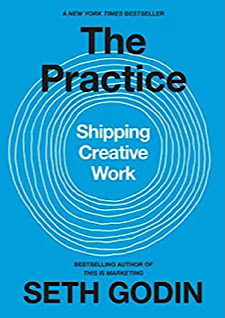“The ability to eagerly suggest an alternative to your work is a sign that your posture is one of generosity, not grasping.”
Seth Godin, The Practice (Page 88)
“When we get really attached to how others will react to our work, we stop focusing on our work and begin to focus on controlling the outcome instead.”
Seth Godin, The Practice (Page 86)
“If the only measure of your worth is in the outcome of a transaction, not in the practice to which you’ve committed, then of course it makes sense to cut corners and to hustle.”
Seth Godin, The Practice (Page 85)
“If our focus is on external validation, then the journey will always be fraught. It’s culturally impossible to do important work that will be loved by everyone. The very act of being ‘important’ means that it will have a different impact on people.”
Seth Godin, The Practice (Page 72)
“A key component of practical empathy is a commitment to not be empathic to everyone. A contemporary painter must ignore the criticism or disdain that comes from someone who’s hoping for a classical still life. The tech innovator has to be okay with leaving behind the laggard who’s still using a VCR. That’s okay, because the work isn’t for them. ‘It’s not for you’ is the unspoken possible companion to ‘Here, I made this.'”
Seth Godin, The Practice (Page 71)
“In order to say no with consistency and generosity, we need to have something to say ‘yes’ to.”
Justine Musk (writer), via The Practice (Page 58)
“Selling can feel selfish. We want to avoid hustling people, and so it’s easy to hold back in fear of manipulating someone. Here’s an easy test for manipulation: if the people you’re interacting with discover what you already know, will they be glad that they did what you asked them to?”
Seth Godin, The Practice (Page 46)
“Writers write. Runners run. Establish your identity by doing your work.”
Seth Godin, The Practice (Page 35)
“Flying across the country is safer than driving. If your goal is to get to Reno, the safest choice is to fly there, not to drive. And if you know of someone who dies in a plane crash on the way to Reno, they didn’t make a bad decision when they chose to fly. There was certainly a bad outcome, though. Decisions are good even if the outcomes aren’t.”
Seth Godin, The Practice (Page 26)
“You can’t really decide to paint a masterpiece. You just have to think hard, work hard, and try to make a painting that you care about. Then, if you’re lucky, your work will find an audience for whom it’s meaningful.”
Susan Kare, The Practice (Page 24)
“Who wants to do difficult work that doesn’t fulfill us? Who wants to commit to a journey before we know it’s what we were meant to do? The trap is this: only after we do the difficult work does it become our calling. Only after we trust the process does it become our passion. ‘Do what you love’ is for amateurs. ‘Love what you do’ is the mantra for professionals.”
Seth Godin, The Practice (Page 22)
“If you want to change your story, change your actions first. When we choose to act a certain way, our mind can’t help but rework our narrative to make those actions become coherent. We become what we do.”
Seth Godin, The Practice (Page 19) | Read Matt’s Blog On This Quote ➜
“One of the problems with art is that it is self-anointing: Anyone can be an artist by simply pointing to themselves and saying so. The truth is that there are very few artists. [Making the world a better place through art] is the highest attainment of the specialization. It is to recognize that it is not all about you, and that you have a communal function you can serve to help everyone get along. This is important for people to understand, especially in a capitalist society.”
Milton Glaser, via The Practice (Page 17)
“Lost in all the noise around us is the proven truth about creativity: it’s the result of desire—the desire to find a new truth, solve an old problem, or serve someone else. Creativity is a choice, it’s not a bolt of lightning from somewhere else.”
Seth Godin, The Practice (Page 3)
“A genius is the one most like himself.”
Thelonious Monk, via The Practice
The Practice: Shipping Creative Work [Book]

Book Overview: Creative work doesn’t come with a guarantee. But there is a pattern to who succeeds and who doesn’t. And engaging in the consistent practice of its pursuit is the best way forward. Based on the breakthrough Akimbo workshop pioneered by legendary author Seth Godin, The Practice will help you get unstuck and find the courage to make and share creative work. Godin insists that writer’s block is a myth, that consistency is far more important than authenticity, and that experiencing the imposter syndrome is a sign that you’re a well-adjusted human. Most of all, he shows you what it takes to turn your passion from a private distraction to a productive contribution, the one you’ve been seeking to share all along. With this book as your guide, you’ll learn to dance with your fear. To take the risks worth taking. And to embrace the empathy required to make work that contributes with authenticity and joy.
Post(s) Inspired by This Book: